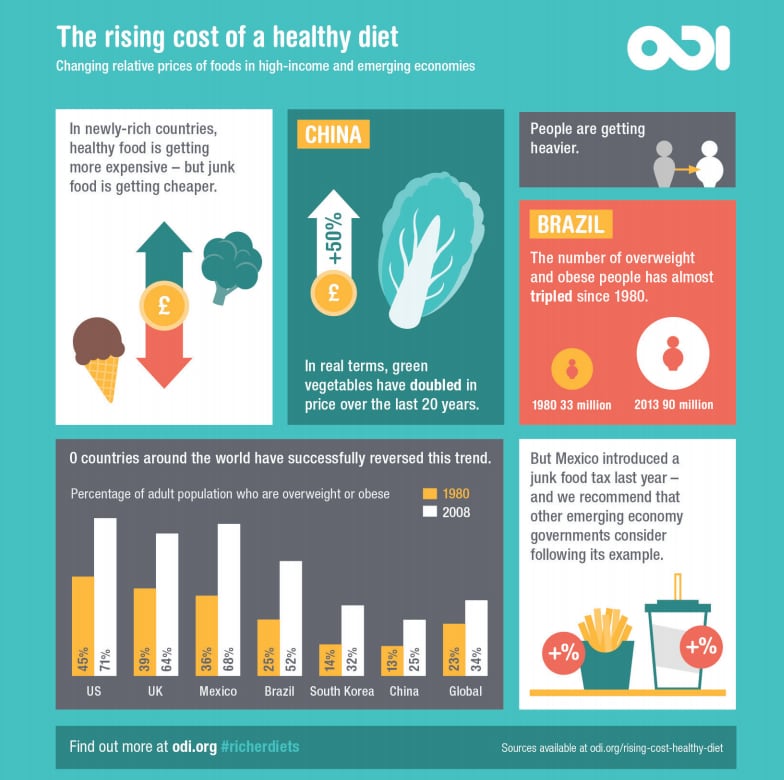A report by independent UK think-tank ODI compared retail food prices, consumption of healthy and unhealthy foods and obesity levels in five countries - the USA, UK, Mexico, China and Korea – over the past thirty years.
It found that as energy-dense processed food became cheaper and healthy food rose in price, the obesity crisis – a global health epidemic that no country has succeeded in offsetting - has spiralled.
In Brazil, where obesity levels have almost tripled since 1980, sales of energy-dense food formulated to be hyper-palatable is on the rise, while in China the price of green vegetables has doubled in twenty years.

Using data from various studies, the researchers found the price of fruit and vegetables has risen substantially since 1990 – by 2–3 % a year on average, or by 55–91% between 1990 and 2012. Meanwhile four of the six processed products showed significant falls in prices.
Explaining the trend
The report identified three possible reasons for the rising cost of fruit and vegetables. A rise in specialty varieties of fruit and vegetables sold at a premium price, such as on-the-vine tomatoes, which created a gradual upward price trend for tomatoes in general.
Meanwhile the demand for fruit and vegetables out of season had also pushed up production costs, as had the rise in sales of pre-washed, fresh-cut produce which required more processing and packaging.
Simultaneous advances in R&D had cut the cost of processed food.
“Much processed food does not rely on costly farm ingredients, but rather is manufactured from relatively cheap ingredients, the added value being largely in factory processes of combining the ingredients and enhancing their flavour," the report said. "Advances in manufacturing and flavouring probably help reduce unit costs in factory.”
'Taxation is the solution'
The study’s authors have called for taxation on energy-dense foods and subsidies for healthier foods, pointing to Mexico, which introduced a 'sin tax' in 2013, as an example of an emerging country stealing the march on high income countries.
Lead author and ODI researcher Steve Wiggins said: “We hope that our study can contribute to thinking about the possibility of using moderate taxes and subsidies to nudge people’s diets in the right direction.”
“One country in the world which has taken the plunge is Mexico. In December 2013 the Mexican legislature put on a tax onto sugary, sweetened beverages, sodas and colas of which Mexicans are extremely fond and a tax on foods that are rich in energy.
"That Mexican experience is less than 18 months old and has been very keenly monitored by health experts to see if those taxes are indeed influential in changing the diet.”
But early reports suggest the tax is having an effect; a 2014 National Obesity Survey involving 1,500 adults found that 52% of Mexicans had reduced intake of sugar sweetened beverages in 2014.
Against arguments that taxation must be disproportionately high in order to have an effect on consumption patterns, and therefore unfair to lower income families, the authors said that the focus should be on the concrete benefits derived from taxation, such as a fall in premature deaths and the resulting alleviation on health systems.
“The argument about ‘small taxes, small gains’ is tantamount to arguments that condemn doing good because perfection is unattainable,” they said, pointing to a 2009 study by Nnoaham et al. which suggested that taxes and subsidies of less than 20% in the UK could prevent 6,400 premature deaths from coronary heart disease and cancer .
The authors said this was the first study which compared the changing costs of foods from different food groups across a sample of developed and developing countries.
The full report can read here.
